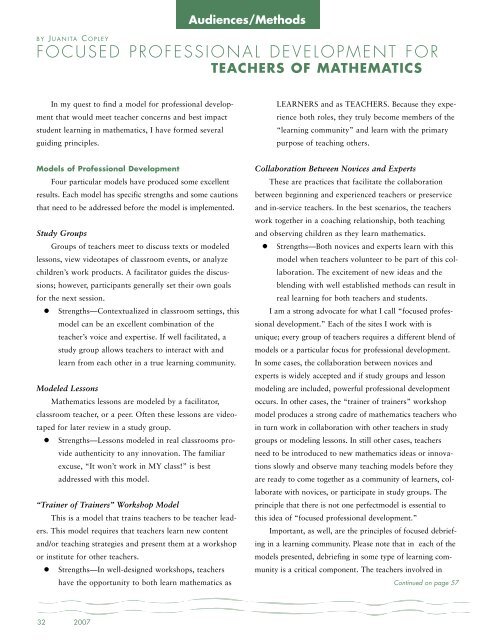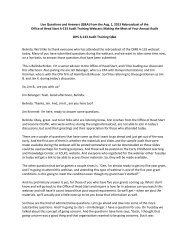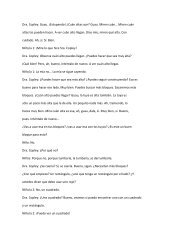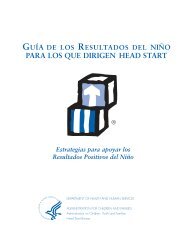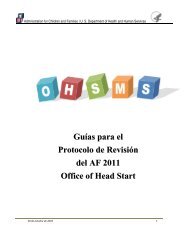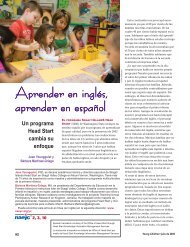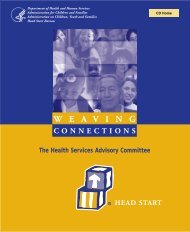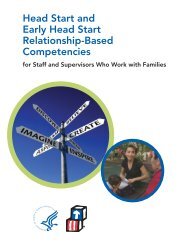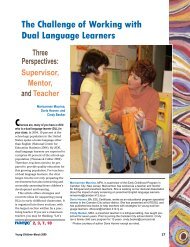Professional Development - Head Start - U.S. Department of Health ...
Professional Development - Head Start - U.S. Department of Health ...
Professional Development - Head Start - U.S. Department of Health ...
You also want an ePaper? Increase the reach of your titles
YUMPU automatically turns print PDFs into web optimized ePapers that Google loves.
In my quest to find a model for pr<strong>of</strong>essional development<br />
that would meet teacher concerns and best impact<br />
student learning in mathematics, I have formed several<br />
guiding principles.<br />
Models <strong>of</strong> <strong>Pr<strong>of</strong>essional</strong> <strong>Development</strong><br />
Four particular models have produced some excellent<br />
results. Each model has specific strengths and some cautions<br />
that need to be addressed before the model is implemented.<br />
Study Groups<br />
Groups <strong>of</strong> teachers meet to discuss texts or modeled<br />
lessons, view videotapes <strong>of</strong> classroom events, or analyze<br />
children’s work products. A facilitator guides the discussions;<br />
however, participants generally set their own goals<br />
for the next session.<br />
� Strengths—Contextualized in classroom settings, this<br />
model can be an excellent combination <strong>of</strong> the<br />
teacher’s voice and expertise. If well facilitated, a<br />
study group allows teachers to interact with and<br />
learn from each other in a true learning community.<br />
Modeled Lessons<br />
Mathematics lessons are modeled by a facilitator,<br />
classroom teacher, or a peer. Often these lessons are videotaped<br />
for later review in a study group.<br />
� Strengths—Lessons modeled in real classrooms provide<br />
authenticity to any innovation. The familiar<br />
excuse, “It won’t work in MY class!” is best<br />
addressed with this model.<br />
“Trainer <strong>of</strong> Trainers” Workshop Model<br />
This is a model that trains teachers to be teacher leaders.<br />
This model requires that teachers learn new content<br />
and/or teaching strategies and present them at a workshop<br />
or institute for other teachers.<br />
� Strengths—In well-designed workshops, teachers<br />
have the opportunity to both learn mathematics as<br />
32 2007<br />
Audiences/Methods<br />
BY J UANITA C OPLEY<br />
FOCUSED PROFESSIONAL DEVELOPMENT FOR<br />
TEACHERS OF MATHEMATICS<br />
LEARNERS and as TEACHERS. Because they experience<br />
both roles, they truly become members <strong>of</strong> the<br />
“learning community” and learn with the primary<br />
purpose <strong>of</strong> teaching others.<br />
Collaboration Between Novices and Experts<br />
These are practices that facilitate the collaboration<br />
between beginning and experienced teachers or preservice<br />
and in-service teachers. In the best scenarios, the teachers<br />
work together in a coaching relationship, both teaching<br />
and observing children as they learn mathematics.<br />
� Strengths—Both novices and experts learn with this<br />
model when teachers volunteer to be part <strong>of</strong> this collaboration.<br />
The excitement <strong>of</strong> new ideas and the<br />
blending with well established methods can result in<br />
real learning for both teachers and students.<br />
I am a strong advocate for what I call “focused pr<strong>of</strong>essional<br />
development.” Each <strong>of</strong> the sites I work with is<br />
unique; every group <strong>of</strong> teachers requires a different blend <strong>of</strong><br />
models or a particular focus for pr<strong>of</strong>essional development.<br />
In some cases, the collaboration between novices and<br />
experts is widely accepted and if study groups and lesson<br />
modeling are included, powerful pr<strong>of</strong>essional development<br />
occurs. In other cases, the “trainer <strong>of</strong> trainers” workshop<br />
model produces a strong cadre <strong>of</strong> mathematics teachers who<br />
in turn work in collaboration with other teachers in study<br />
groups or modeling lessons. In still other cases, teachers<br />
need to be introduced to new mathematics ideas or innovations<br />
slowly and observe many teaching models before they<br />
are ready to come together as a community <strong>of</strong> learners, collaborate<br />
with novices, or participate in study groups. The<br />
principle that there is not one perfectmodel is essential to<br />
this idea <strong>of</strong> “focused pr<strong>of</strong>essional development.”<br />
Important, as well, are the principles <strong>of</strong> focused debriefing<br />
in a learning community. Please note that in each <strong>of</strong> the<br />
models presented, debriefing in some type <strong>of</strong> learning community<br />
is a critical component. The teachers involved in<br />
Continued on page 57


